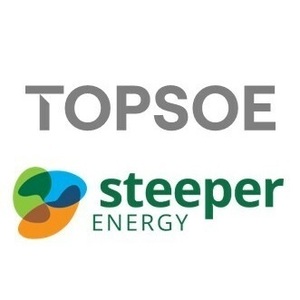Steeper Energy, Topsoe partner to offer waste-to-biofuel solution

January 26, 2023
BY Steeper Energy
Topsoe, a global leader in carbon emission reduction technologies, and Steeper, a pioneer within biomass conversion technologies, have today signed a global licensing agreement for a complete waste-to-fuel solution. The agreement combines Topsoe's unique technologies in renewable fuels and hydrogen production as well as decades of experience in engineering, with Steeper's proprietary Hydrofaction technology and industry know-how.
With the agreement, Topsoe will be able to provide a complete waste-to-fuel technology solution and at the same time a one-stop solution for refineries, project developers, and industries having access to excess waste biomass. The end-products include sustainable aviation fuel (SAF), marine biofuel, and renewable diesel from waste biomass.
Peter Vang Christensen, senior vice president, clean fuels and chemicals – technology, Topsoe, said, "We are excited to work with Steeper and to combine our technological capabilities. This will make it easier for refineries and project developers to access the technology they need for advanced biofuels. It will also allow them to access new renewable feedstocks while supporting decarbonization of the transportation sector, not least aviation and shipping."
Advertisement
Bevan May, president, Steeper Energy, said, "Steeper recognizes Topsoe as a world leader in developing and implementing renewable refining technologies. Steeper's Hydrofaction® process, when combined with Topsoe's technology, completes the pathway from biomass waste to drop-in liquid fuels and is compatible with existing refining infrastructure. This reduces capital requirements and allows for the accelerated deployment of these solutions. We are excited to combine our efforts with Topsoe and bring our joint solution to the renewable liquid fuels market."
Steeper's Hydrofaction has been validated through various stages of continuous pilot and demonstration-scale plant operations over the past 10 years.
Advertisement
With this agreement, the parties are working towards the first commercial scale deployment of Hydrofaction technology.
What is Hydrothermal liquefaction
Hydrothermal liquefaction (HTL) applies supercritical water as a reaction medium for the conversion of biomass directly into a high-energy density renewable biocrude oil. Steeper's unique process mimics and accelerates nature by subjecting wet biomass to heat and high pressure. The process conditions are carefully chosen to promote reaction pathways that favor high yields of high-quality renewable oil. With Steeper's Hydrofaction technology it is possible to convert up to 85 percent of incoming biomass on an energy basis, making it one of the most effective conversion technologies available.
Related Stories
CoBank’s latest quarterly research report, released July 10, highlights current uncertainty around the implementation of three biofuel policies, RFS RVOs, small refinery exemptions (SREs) and the 45Z clean fuels production tax credit.
The U.S. Energy Information Administration maintained its forecast for 2025 and 2026 biodiesel, renewable diesel and sustainable aviation fuel (SAF) production in its latest Short-Term Energy Outlook, released July 8.
XCF Global Inc. on July 10 shared its strategic plan to invest close to $1 billion in developing a network of SAF production facilities, expanding its U.S. footprint, and advancing its international growth strategy.
U.S. fuel ethanol capacity fell slightly in April, while biodiesel and renewable diesel capacity held steady, according to data released by the U.S. EIA on June 30. Feedstock consumption was down when compared to the previous month.
XCF Global Inc. on July 8 provided a production update on its flagship New Rise Reno facility, underscoring that the plant has successfully produced SAF, renewable diesel, and renewable naphtha during its initial ramp-up.
Upcoming Events










